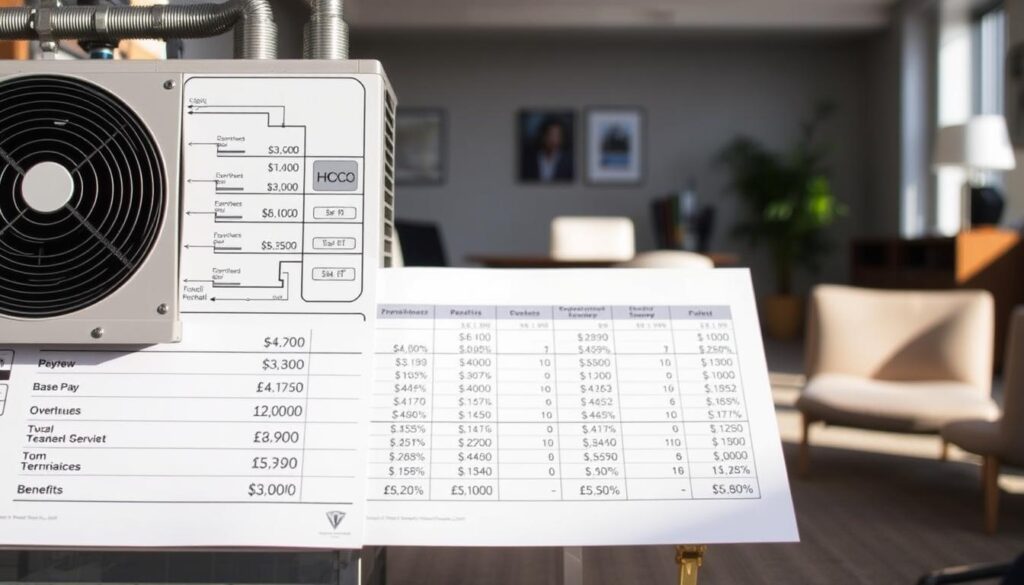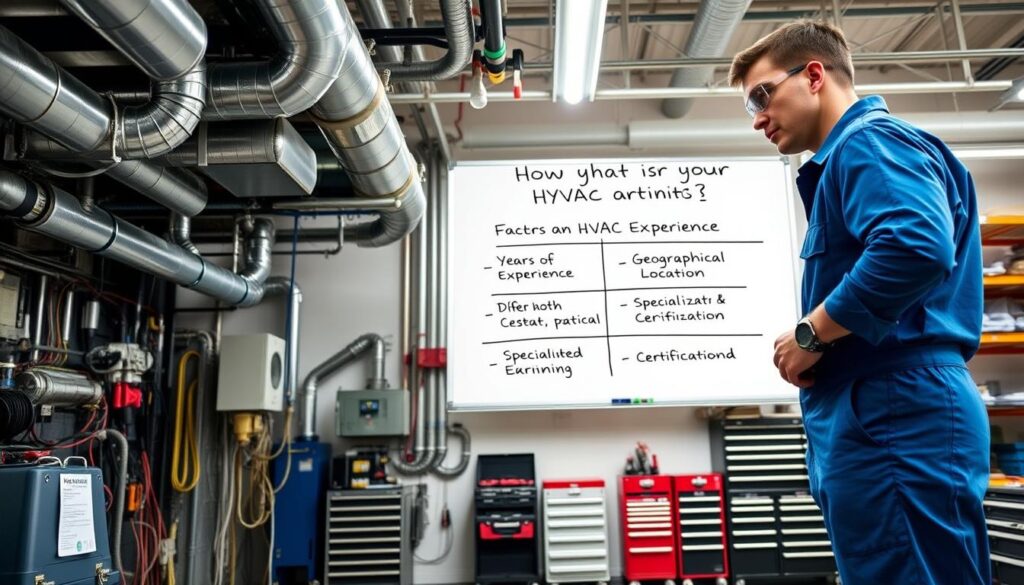Affiliate Disclosure
HVAC Guide Guys is a participant in the Amazon Services LLC Associates Program, an affiliate advertising program designed to provide a means for sites to earn advertising fees by advertising and linking to Amazon.
How Much Do You Make a Year in HVAC? Thinking about becoming an HVAC technician? It’s more than just a job. It’s a chance for a stable career with good pay.

Want to know how much you can earn in HVAC? The Bureau of Labor Statistics says HVAC techs make about $48,730 a year on average. This number has been going up.
This guide will cover everything about HVAC technician salaries. You’ll learn about salary ranges, career growth, and what affects your pay. It’s great for both newbies and seasoned pros looking to advance their careers.
Key Takeaways
- HVAC technicians enjoy competitive salary ranges
- Career advancement opportunities are abundant
- Specialized certifications can boost earning
- Geographic location significantly impacts HVAC salaries
- Entry-level positions offer solid starting wages
Table of Contents
Understanding HVAC Career Earnings
The HVAC industry offers promising career opportunities with attractive earnings. As buildings get more complex and energy efficiency matters more, skilled technicians can earn well. This field is dynamic and rewarding.
Your HVAC career can bring substantial financial rewards. The industry offers many ways to grow professionally and increase earnings. This is through strategic skill development and specialization.
Base Salary Components
HVAC professionals earn income from several key areas:
- Base hourly wage
- Overtime compensation
- Performance bonuses
- Commission opportunities
Industry Growth Projections
| Year | Projected Growth | Job Opportunities |
|---|---|---|
| 2020-2030 | 5% Increase | 14,400 New Positions |
| 2030-2035 | Estimated 6-7% | Expanding Market Demand |
Career Development Opportunities
Advancing your HVAC career can greatly increase your earnings. Consider these professional development paths:
- Specialized Certifications
- Advanced Technical Training
- Management Roles
- Commercial/Industrial Specialization
By investing in continuous learning and skill enhancement, you can turn your HVAC career into a lucrative long-term profession. It offers impressive financial prospects.
Explore Our HVAC Shop
Looking for top-rated HVAC tools, parts, and accessories? Visit our shop and find the perfect solution for your needs.
Visit the ShopNational Average HVAC Technician Salaries
Knowing the national average hvac technician salary is key for those in the field. In 2020, the Bureau of Labor Statistics found HVAC technicians made a median of $48,730 a year. This is across the whole United States.
Your salary can change a lot based on a few important things. Experience level is a big factor:
- Starting out, technicians make about $31,000 a year
- Those in the middle make $48,000 to $55,000
- Top earners can make up to $80,000 a year
Having special skills and certifications also matters a lot. Those who get advanced training and work on complex systems usually earn more. This is because the HVAC market is very competitive.
Where you work can also affect how much you make. Places with higher living costs and more need for climate control services often pay more.
Experience Levels and Corresponding Pay Scales
Your HVAC career journey is tied to your experience and skills. Knowing how hvac installer wages grow helps plan your career and earnings.
The HVAC industry has a clear path for career growth. Salaries increase as you gain more experience and take on more responsibilities. Let’s look at how hvac service pay rates change with experience.
Entry-Level Positions (0-5 years)
Starting in HVAC, your first earnings show your basic skills and training. Entry-level jobs usually have:
- Average hourly wage: $22
- Annual salary range: $40,000 – $50,000
- Learning basic technical skills
- Hands-on experience under supervision
Senior Technician Earnings (6-9 years)
With more experience and skills, your pay goes up. Senior technicians earn:
- Average hourly wage: $27.65
- Annual salary range: $55,000 – $60,000
- Advanced technical knowledge
- More complex projects
Management Level Income (10+ years)
Reaching management in HVAC is a big achievement. Experienced pros can earn:
| Experience Level | Hourly Wage | Annual Salary |
|---|---|---|
| Management Level | $32.83 | $65,000 – $75,000 |
Your HVAC career grows with learning, skill improvement, and certifications. Invest in your education and technical skills to boost your earnings.
Explore Our HVAC Shop
Looking for top-rated HVAC tools, parts, and accessories? Visit our shop and find the perfect solution for your needs.
Visit the ShopHow Much Do You Make a Year in HVAC: Breaking Down the Numbers

Exploring the HVAC salary landscape is key for career planning. HVAC annual income varies based on several factors. These factors can greatly affect your earnings.
HVAC professionals can earn between $30,000 and $80,000 a year. Your income depends on several important things:
- Geographic location
- Years of experience
- Specialization within HVAC
- Industry sector
- Certification levels
Here’s a detailed look at HVAC annual income ranges:
| Experience Level | Typical Salary Range | Key Factors |
|---|---|---|
| Entry-Level (0-2 years) | $30,000 – $42,000 | Basic certifications, minimal specialized skills |
| Mid-Level (3-5 years) | $45,000 – $55,000 | Advanced certifications, growing expertise |
| Experienced (6-10 years) | $55,000 – $70,000 | Specialized skills, multiple certifications |
| Senior/Management (10+ years) | $70,000 – $80,000+ | Advanced expertise, leadership roles |
Pro Tip: Invest in continuous education and specialized certifications. This can greatly increase your HVAC annual income. Your dedication to learning can significantly boost your earnings.
Explore Our HVAC Shop
Looking for top-rated HVAC tools, parts, and accessories? Visit our shop and find the perfect solution for your needs.
Visit the ShopTop-Paying States for HVAC Professionals
Your salary as an HVAC technician can change a lot based on where you work. Some states pay HVAC pros a lot more than others. Knowing these differences can help you choose the best place for your career.
The best states for HVAC contractors offer great pay. Things like the local economy, climate needs, and how complex the industry is affect how much you get paid. These factors vary from one place to another.
| State | Median Annual Salary | Cost of Living Index |
|---|---|---|
| Alaska | $68,000 | 125.9 |
| Hawaii | $67,500 | 193.3 |
| Washington | $65,000 | 111.6 |
| Massachusetts | $64,500 | 135.0 |
| Connecticut | $62,000 | 127.7 |
When looking at states for HVAC jobs, consider these things:
- Places with extreme weather need more advanced HVAC systems
- Big cities usually pay more
- States with lots of building projects tend to pay better
Pro tip: While high salaries are tempting, remember to check the cost of living. This way, you can see if your money really goes further.
Factors Affecting HVAC Technician Earnings
Your income as an HVAC pro depends on many factors. Knowing these can help you increase your earnings and grow your career.

Success in HVAC isn’t just about knowing how to fix things. Several important factors affect your income.
Geographic Location Dynamics
Your location greatly affects how much you can earn. Different places offer different pay levels due to:
- Local economic conditions
- Industry demand
- Cost of living
- Population density
Certification Requirements
Having professional certifications can really boost your value. They show you’re an expert and deserve more pay.
| Certification | Potential Salary Increase |
|---|---|
| NATE Certification | 10-15% higher earnings |
| EPA Section 608 | 5-10% salary boost |
| Advanced Specialization | 15-25% income growth |
Industry Specializations
Choosing a specific HVAC area can lead to better pay. Specialized technicians often get paid more in fields like:
- Commercial refrigeration
- Industrial HVAC systems
- Green technology installations
- Data center cooling solutions
By focusing on your skills and getting the right certifications, you can improve your career and earnings.
Explore Our HVAC Shop
Looking for top-rated HVAC tools, parts, and accessories? Visit our shop and find the perfect solution for your needs.
Visit the ShopBenefits and Compensation Packages
When looking at an HVAC technician’s salary, it’s key to see the whole picture. Your earnings aren’t just the base salary. They also include many benefits that can really improve your financial situation.
Most HVAC companies offer great packages to keep skilled workers. These packages usually have:
- Health insurance coverage
- Dental and vision plans
- 401(k) retirement savings options
- Paid time off and vacation days
- Continuing education allowances
There are also special benefits for HVAC techs that can increase your pay. These might include:
- Tool and equipment allowances
- Company vehicle usage
- Performance-based bonuses
- Overtime compensation
| Benefit Category | Estimated Annual Value |
|---|---|
| Health Insurance | $6,000 – $12,000 |
| Retirement Contributions | $2,000 – $5,000 |
| Tool Allowance | $500 – $2,000 |
| Performance Bonuses | $1,000 – $5,000 |
Don’t just look at the base salary when choosing a job. A strong benefits package can greatly increase your total earnings. This can make a big difference in your financial future.
Career Advancement and Salary Growth
Your HVAC career is full of chances for growth and higher pay. As you get better at your job, you’ll find many ways to increase your earnings. This will also open up new opportunities for you.
To move up in the HVAC field, you need a plan and to keep learning. Knowing the right steps can really help your salary grow.
Professional Development Paths
There are several steps to climb in the HVAC world:
- Entry-level technician
- Specialized technician
- Senior technician
- Supervisor
- Management role
Enhancing Your Certifications
Getting more certifications can make you more valuable. Look into getting special skills that show you know a lot:
- NATE (North American Technician Excellence) Certification
- EPA Section 608 Certification
- Energy Efficiency Specialist Credentials
- Commercial HVAC Systems Certification
Management Opportunities
Going into management can really boost your income. HVAC managers can make over $90,800 a year. This is a big jump from being a technician.
Plan your career well, keep learning, and focus on growing. This will help you make the most of your HVAC career and achieve lasting success.
Explore Our HVAC Shop
Looking for top-rated HVAC tools, parts, and accessories? Visit our shop and find the perfect solution for your needs.
Visit the ShopCommercial vs Residential HVAC Salaries
Looking into hvac installer wages shows big differences between commercial and residential HVAC. Salaries change a lot based on system complexity, job needs, and special skills.
Commercial HVAC techs usually make more money than those in residential HVAC. This is because commercial systems are more complex. They need advanced skills. Your earnings as an hvac engineer can show this.
- Commercial HVAC average salary: $65,000 – $85,000 annually
- Residential HVAC average salary: $45,000 – $65,000 annually
- Specialized commercial certifications can boost earnings by 15-25%
What makes salaries different includes:
- System complexity – Commercial systems are more complex
- Technical skill needs
- Job site environments
- Opportunities for more education
Your career path greatly affects how much you can earn. Moving between residential and commercial HVAC needs careful skill building and specific certifications.
Investing in advanced training can greatly increase your HVAC career earnings.
Conclusion
Exploring the HVAC industry shows a world of chances. HVAC jobs can pay between $30,000 and $80,000 a year. With the right skills and experience, you can make more money.
Your salary in HVAC depends on several things. These include where you work, how long you’ve been doing it, your certifications, and your area of expertise. Getting better at your job and getting more certifications can lead to higher pay.
The HVAC field is growing and has lots of job openings. By improving your skills, keeping up with new tech, and exploring different areas, you can have a fulfilling and well-paying job. Your hard work and dedication will help you grow in this important field.
Starting as a beginner or aiming for a top job, HVAC has a clear path to success. Your hard work and smart choices will shape your earnings and career in this vital and changing industry.

